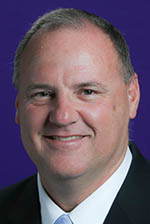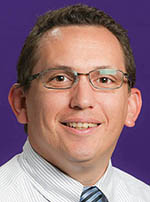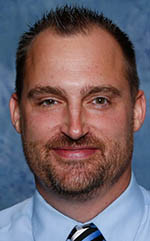By Rick Vacek
GCU News Bureau
The Integration of Faith, Learning and Work sessions for Grand Canyon University faculty are focused on the work aspect for the 2015-16 school year, and the first “Lunch and Learn” Friday sparked an interesting discussion about how to know you’re in the right career.
Who better than two teachers to address the topic with appropriate passion?
Paul Danuser and Brandon Juarez of the College of Education tackled the idea of “Work as Divine Calling” with gusto and humor. Elementary and high school teachers long have been among the most underpaid and unappreciated workers in the United States, but their love for what they do is what keeps them going — and that devotion to students and to the teaching craft doesn’t leave them once they become university instructors.
Indeed, Danuser said he enjoys what he does so much, he wishes he could do it every day. But he acknowledged that the enormity of the teaching challenge has grown exponentially over the years, and he did so with two equations that got a big laugh from the standing-room-only audience in Howerton Hall:
His old formula:
C + H + GT
(Confidence + Humility = Great Teacher)
His new formula:
C + H + HW + F + C + P1 + P2 + I + D + SoH = GT
(Confidence + Humility + Hard work + Faith + Compassion + Patience + Passion + Intelligence + Dedication + Sense of Humor = Great Teacher)
The main point Danuser and Juarez were trying to make: “If we see our work without seeing the people we work with, we are missing out. When we focus on the fundamental act of caring for others, we see our work as a calling.”
Dr. Jason Hiles, dean of the College of Theology, followed with the general theological perspective of work as a divine calling.
“Whether our work matters is a matter of faith,” he said.
Hiles used a quote from Dorothy L. Sayers, a renowned English essayist and Christian humanist who died in 1957, about work:
“It is, or it should be, the full expression of the worker’s faculties, the thing in which he finds spiritual, mental and bodily satisfaction, and the medium in which he offers himself to God.”
Hiles said we are called in three ways:
- To Christ (salvation)
- To a specific purpose or mission (vocational)
- To immediate needs and responsibilities (dutiful)
The danger in our work, he said, is that we tend to err in two ways: Either we love work too much (it becomes our identity and consumes us) or too little (it becomes inconsequential).
Again, a teacher had the right advice for all those workaholics out there:
“We cannot allow the ‘busyness’ to blind us from serving others and recognizing our work as a divine calling,” Juarez said.
● Next Integration of Faith, Learning and Work session: Friday, Oct. 16, Josh Danaher, College of Humanities and Social Sciences, "Work as Cultivation and Service"
Contact Rick Vacek at 639.8203 or [email protected].











































